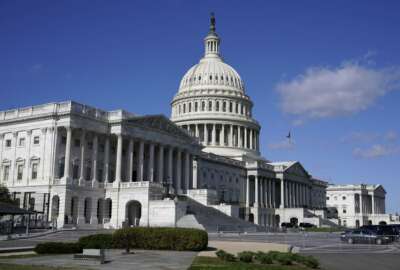How Congress plans to fill in the budget framework for 2022 appropriations
Congress bought more time to fill in a framework for 2022 appropriations that put the government into another three weeks of continuing resolution.
Best listening experience is on Chrome, Firefox or Safari. Subscribe to Federal Drive’s daily audio interviews on Apple Podcasts or PodcastOne.
Congress bought more time to fill in what members call a framework for 2022 appropriations, that put the government into another three weeks of continuing resolution. So just what are the prospects for an actual budget? Bloomberg Government Congress reporter Jack Fitzpatrick spoke to the Federal Drive with Tom Temin about it.
Interview transcript:
Tom Temin: Jack, good to have you back.
Jack Fitzpatrick: Thanks for having me.
Tom Temin: And Congress is not in session this week. So is anything going on because now they’ll be back to two weeks before the end of another continuing resolution?
Jack Fitzpatrick: Yeah, there will be a lot of work going on for a recess week, it’s just going to be behind the scenes. A little before they left, they agreed on a basic framework of how to approach an omnibus government funding bill. Basically, they agreed on the defense and nondefense number, and then sent each of the 12 heads of the subcommittees their number that they have to work within. So at this point, they call ’em the cardinals because they’re essentially one step below the pope on appropriations. All the subcommittee leaders are writing their bills now that they have a final number to say here’s how much money you have to spend. I would look for, the Democratic priorities seem to be significant increases in public health funds, probably a big increase for HHS. Also climate and environment, and then Republicans got a solid Defense increase. They haven’t released all the specific numbers yet. But Richard Shelby, the top Republican in the Senate on appropriations, said this is actually going to be a bigger Defense increase than what was approved in the Defense authorization bill late last year, that was a 5% increase. So we’re gonna see something, at least slightly north of a 5% Defense increase. And they’ll try to hash out all the details by March 11 which is the new deadline now.
Tom Temin: And is it kosher to appropriate more than was authorized in the NDAA?
Jack Fitzpatrick: Yeah, they can do that. That’s a limitation of authorizers is they can set the framework, but appropriators sometimes authorized within their appropriations bills sometimes go beyond. Technically, you are not supposed to do that but it happens. And we’ll see exactly how they work out the details and what they spend the extra money on. I would note, talking to Republicans, I brought this up with Lindsey Graham, for example, asking is the Russia Ukraine situation changing the debate on Defense spending because of increased needs? And his answer, and the Republican line essentially seems to be yeah, if we’re looking at Russia and Ukraine, the floor for these negotiations was the amount of the increase in the authorization bill. And evidently, they got at least a little bit more. It may only be a few billion more, we’ll see exactly what the number comes out to be. But they wanted a little more than that.
Tom Temin: Yeah so that Russian threat situation and also what’s going on with China, pretty much day in day out then, in effect gives the Democrats the fig leaf they need to sell it to their constituents, instead of holding the line on Defense budget. They’re at each other’s throats. So civilian spending is held in check by the Republicans, the Defense by the Democrats, they give each other what they want. So now the Democrats at least have a reason that they could go for this.
Jack Fitzpatrick: It’s not the easiest thing for the Democrats to sell their members on. Remember one of the early stop gaps they needed earlier this fiscal year, there was some pushback by the most progressive members who objected to the extra money that was in there for Israel’s Iron Dome defense money. But really the center of the Democratic Party has seemed to find it acceptable, not only to provide that kind of thing, but provide an overall Defense increase if they get their nondefense increases, which Republicans have agreed to. So I would expect there to be some progressive pushback, and maybe some heartburn over it. But the calls that you heard early in the year from progressives to cut the military budget and that kind of thing have seemed to just fall off the table lately.
Tom Temin: We’re speaking with Jack Fitzpatrick, Congress reporter for Bloomberg Government. And then there’s actually a gambit to eliminate the idea of a budget ceiling, which would seem to say, OK let’s just roll the presses.
Jack Fitzpatrick: Yeah, the debt limit, the past few months has become less and less popular with Democrats. Looking back to the standoff that went on for a few months last year. I think one of the points of frustrations for Democrats was that Republicans said to Democrats, you do this on your own, they wanted them to do it through the reconciliation process and increase the debt ceiling without any Republican votes. That started getting not only progressives, but really people aligned with leadership in the Democratic Party complaining, why are why are we even doing this? So the latest development is a bill to abolish the debt ceiling. And interestingly enough on the House side that’s introduced by the budget chairman John Yarmuth, as well as Brendan Boyle. On the Senate side, it’s introduced by the majority whip Dick Durbin, and they had a hearing on this topic and the House Majority Leader Steny Hoyer came in and spoke approvingly of it. So this is really kind of an idea that has worked its way into Democratic leadership. I don’t think a bill to abolish the debt limit would actually get the 60 votes necessary. At this point, you got a lot of Republican pushback. But remember that, for one, they can raise the debt limit as high as they want in a partisan way through the reconciliation process. And we heard during that standoff, the Chairman John Yarmuth say why don’t we raise it to a gazillion and effectively eliminate it? There are other weird end arounds, they actually raised the coin thing, mint a trillion dollar coin and transfer that so it technically doesn’t count against the debt limit. It makes me wonder if as we get toward the next debt limit standoff, which would be late this year, early next year, do they try some sort of end around to effectively eliminate it if they can’t formally abolish it with 60 votes in the Senate?
Tom Temin: I like that idea of a trillion dollar coin. I guess they could make it a trillion dollar, crypto coin. And it would –
Jack Fitzpatrick: I’d like to think it’d be a really big, physical coin in a bank ball. But maybe it’s crypto, yeah.
Tom Temin: It would be the door to the bank vault probably or something like that, nonfungible or whatever it has to be. Alright, and so the Senate then when it does return, of course, it looks like the if you watch the tea leaves, that there is a nominee in the mind of the president for Supreme Court. And that’s going to take up a lot of Senate time with the roundabout and the courtesies, and therefore, they would probably want that omnibus to just be a quick vote.
Jack Fitzpatrick: Yeah, they are pretty determined to get government funding done by that March 11 deadline and not have to rely on another stopgap and buy more time. We’ve heard from Democratic leadership they’re eyeing a pretty fast timeframe for the Supreme Court confirmation process. There was a reference from Chuck Schumer that he wants to essentially go with the Amy Coney Barrett timeline, which only took about a month after she was selected. That would indicate there’s a lot of motivation to just get government funding done by that March 11 deadline, I actually heard from one member, John Hoeven, the top Republican on agricultural appropriations, who said he was surprised they didn’t get more time. It seems like a decision to really keep the pressure on and then move on quickly to other things. But the idea is to move as fast as possible, get all the legislating done during this recess week, basically, and then go to the House and Senate floor as fast as possible with the omnibus because they’ve got so much else to do.
Tom Temin: And can anything else really big happen in the rest of the year, because in general, isn’t August the kind of kickoff for the midterm election activity, and Congress is going to be concentrating on, “I want to come back here,” at least on the House, except for the 30 or 40 that are retiring.
Jack Fitzpatrick: Right, they’re not going to want to come back in August. You’re right. Of course, there are 30 Democrats in the House retiring, so maybe there are a few people concerned with their own reelection. But yeah, when you head toward a midterm election, even for some of the weeks off in the spring, members value that time back in their district, whether it’s fundraising or going to events. So this is going to be a tough year to have any other major legislative accomplishments for Democrats, they still are kind of talking about remnants of the Build Back Better proposals that maybe they could do a very limited bill. Sen. [Joe] Manchin seems to support the climate and energy funding issues, maybe they could tack on Pre-K education and just do something limited? But again, there’s not that much time left, and they haven’t been actively negotiating that lately. So we’re looking forward to an omnibus, Supreme Court nominations, other nominations like the Fed, and then maybe if they can quickly sneak something through in addition, that’s nice for Democrats but clearly, it would not be a major series of negotiations that would be really expensive and time consuming, because there’s just not much time.
Tom Temin: Alright, so the steam is out of the sails. I guess I’m mixing my metaphors. Jack Fitzpatrick is Congress reporter for Bloomberg Government. Thanks so much.
Jack Fitzpatrick: Thanks for having me.
Copyright © 2025 Federal News Network. All rights reserved. This website is not intended for users located within the European Economic Area.
Tom Temin is host of the Federal Drive and has been providing insight on federal technology and management issues for more than 30 years.
Follow @tteminWFED






